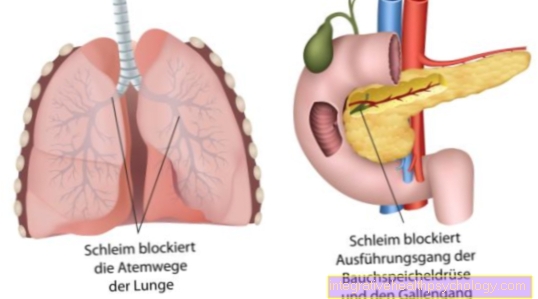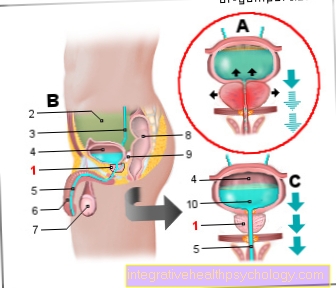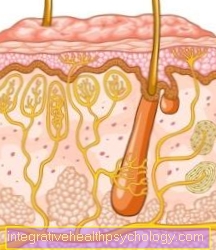Aphthae in the throat
introduction
Under the term "Canker sores“One understands small inflamed bulges in the oral cavity, which are perceived as enormously annoying and painful by those affected.
In the majority of cases, canker sores appear directly on the Oral mucosa in the field of Cheeks and des Oral vestibule (vestibule), sometimes they can also be on the tongue, at the palate, found around the gums and even in the genital area.
The throat and tonsils are also preferred locations for the formation of these small mucous membrane bulges. Not every noticeable bulge in the oral cavity has to be an ulcer. In the case of small, yellow-whitish colored blisters, however, it can be safely assumed that it is a sore throat.

A canker sore in the throat is characterized by a circular to oval, sharply defined whitish depression in the oral mucosa, which is often associated with pain. Aphthae can occur in singular or plural form and are localized not only in the throat, but also on the tongue, the inside of the lip or cheek.
The whitish depressions are covered with a film, a so-called fibrin coating, and the oral mucous membrane around the canker sores is usually very red. Aphthae go through a stage of a primarily emerging blister, which then dissolves and leaves a depression.
Read more on the topic: Aphthae - painful blisters in the mouth and throat
For most of those affected, the canker sores in the throat area keep coming back to comparable places and spontaneously subside. About 10% of the population are affected by regular canker sores.
Causes and therapy still present some puzzles to dentists and doctors, because there is still no scientifically proven reason for the occurrence.
Causes of canker sores in the throat
The causes for the development of canker sores in the throat are still largely unexplained. However, it is known that some factors promote the formation of such a pathological process.
For years, experts have assumed that canker sores in the throat are caused by an interplay between genetic factors and unfavorable behavior. In many cases, canker sores are preceded by specific injuries to the mucous membrane in the throat.
In addition, various foods and / or deficiencies can be the cause. A deficiency in vitamin B12, iron deficiency and / or folic acid is said to promote the formation of canker sores.
Which special foods or food components promote the development of canker sores in the throat seems to be individually different for each person. In many cases, acidic foods seem like:
- fruit
- Lemonade and
- Cola play a role.
Various sweets and raw tomatoes are also said to have a certain connection with the appearance of canker sores in the throat.
Another cause seems to be prolonged stress and lack of sleep. However, this is a non-specific cause, as stress has a general inhibitory effect on the immune system due to the rising cortisol level and thus not only increases the formation of canker sores, but also the general susceptibility to infections.
The canker sore occurs similarly to a simple herpes disease that recurs from time to time, but the canker sore must be clearly differentiated from herpes. Herpes is caused by viruses, while canker sores are unrelated to viruses.
There is no evidence whatsoever that canker sores are infectious, as tests could not detect bacteria, viruses or fungi for the development. All that is known is that the inflammation values in the blood are increased in an aphthous sore.
A familial accumulation of painful inflammation in the mouth has been demonstrated in 30-40% of those affected. These are often chronically recurring canker sores that appear every two to three months for decades and then subside by themselves.
Furthermore, the consumption of gluten can cause a canker sore if you are gluten intolerant. Hormonal changes, such as during pregnancy or menopause, are also suspected of causing canker sores. In general, women are more often affected than men. In addition, patients who smoke have a much lower tendency to develop canker sores than non-smokers, which again puzzles researchers.
Behcet's disease is considered to be the scientifically proven cause of canker sores that develop in bursts. This systemic disease is accompanied by relapsing canker sores in the mouth or on organs, which also occur more frequently in the genital area. These symptoms also include inflammation of the eye chamber with a purulent iris of the eye. These three key symptoms are concise for Behcet's disease.
Read more about this disease at: Behçet's disease
Aphthae in the throat in the child
Aphthae are by no means only problems for adults - on the contrary: small children in particular are often affected by the painful depressions in the oral mucosa. The formation of canker sores in the mouth and throat is associated with fever and high temperature in small children. Researchers explain this because the immune system in toddlers from 1 to 3 years of age is not yet fully developed and the body therefore fights against it. However, there has not yet been any scientific confirmation of this.
Aphthae in the throat during pregnancy
It is discussed that hormonal changes in the body can provoke canker sores, especially in women. Even during pregnancy, when the hormonal balance is completely reorganized, canker sores can form in the throat, which produce unpleasant pain symptoms. However, these subside after one to two weeks.
Some pregnant women report that they were only prone to canker sores during pregnancy, but not before and afterwards. Others complain of having recurring canker sores since pregnancy. The reason for this, however, is not clear.
Symptoms of a canker sore in the throat

Shortly after they develop, canker sores in the throat usually go unnoticed by the affected people, they feel no pain or other restrictions.
However, inflammatory processes develop relatively quickly, which lead to reddening and slight swelling.
Very large canker sores have an increasingly disruptive effect on eating and speaking, and those affected often find them painful.
Symptoms of a canker sore or a group of canker sores are primarily pain. The body's immune response to canker sores resembles an inflammation, which also speaks for the burning pain quality. In the case of canker sores in the throat, dryness and scratching in the throat area can also be felt. The area around the canker sores is tender and sometimes feels warmer than the rest of the lining of the mouth.
The rule is that the more canker sores form, the more intense and uncomfortable the pain. A group of canker sores, but also a giant saphtha, causes more severe complaints than a single small canker sore in the throat.
When it comes to eating, acidic food, but also hot and dry food, can lead to an unpleasant burning sensation on contact. Furthermore, the ingestion of food, primarily the swallowing process, is extremely painful, since it causes friction on the canker sore and it is sensitive to the touch. Just touching the canker sores with the tongue can cause the pain. This problem also produces pain when speaking.
The symptoms are comparable to those of an infectious sore throat. In the case of canker sores, cold food and drinks are also pain relievers and are therefore recommended.
Earache and canker sores in the throat
Discomfort with a canker sore can express not only as pain in the oral cavity. Researchers suspect the burning quality pain may radiate to other regions. This primarily applies to earache. There are several cases in which those affected complain of stabbing earache, which always occurs parallel to the appearance of canker sores in the mouth and throat. Therefore, experts suspect a connection between regular canker sores and the recurring earache.
It is assumed that the anatomical proximity of the regions and the nerve tracts that innervate both the ear and the oral cavity trigger a painful stimulus in the ears due to the irritation of the ulcer. As a rule, the ear that is on the side of the canker sore is affected, which would support this thesis.
Fever with canker sores in the throat
Especially in small children, the formation of canker sores is accompanied by an increased body temperature, as the body tries to fight the canker sores. Adults usually do not have a fever.
In case of doubt, your family doctor or pediatrician should be consulted.
Illustration of canker sores

The most common areas
(blue circles)
- Herpes -
Herpes simplex - Oral mucosa -
Tunica mucosa oris - Tongue -
Lingua - Gums -
Gingiva - Palate -
Palatum - Palatine almond -
Palatine tonsil - Lip -
Labium oris
Examples of large and small canker sores -
(green circles) - Large canker sores - Major form
- Small canker sores - Minor form
You can find an overview of all Dr-Gumpert images at: medical illustrations
Diagnosis of canker sores in the throat
As the causes of canker sores are not yet established, diagnosis is difficult. The most important criterion for diagnosing canker sores is an inspection of the oral mucosa. However, this clinical finding is always related to personal history and the course of education. In the general anamnesis, the medication taken and the general illnesses are in the foreground, because systemic illnesses such as Behcet's disease can cause aphids in episodes, which, however, are completely different from local aphids.
Therefore, the overall picture of the individual and the specific clinical picture of the canker sores that occur must always be taken into account.
If other diseases of the oral mucous membrane could be ruled out, the canker sore usually remains the diagnosis.
Risk of infection with canker sores in the throat
The fact that canker sores are contagious and can be transmitted is wrong and not possible. There are opinions that suggest that bacteria can be the cause, but recent research deviates from this approach. There is no such thing as a virus like the one that can be transmitted in the case of influenza for the occurrence of canker sores.
In addition to the genetic predisposition, a vitamin deficiency, damage to the gums, weakened immune system, etc. are named as causes, which also cannot be transmitted. Aphthae develop from within and are not the result of an infection.
What you should note, however, is that possible causes that can be responsible for a canker sore can be transmitted. For example, a virus can be transmitted that weakens the immune system, so that a canker sore can develop as a side effect.
Read more on the topic: Are canker sores contagious?
Treatment of canker sores in the throat
A specific therapy for canker sores is not yet available, as the cause is unclear. Dentists, homeopathic medicines and the like can only try to shorten the duration, but there is no magic formula that has proven to be successful. Therefore, there is no classic treatment, but many different approaches that try to alleviate the symptoms of canker sores and promote the healing process.
The canker sores usually heal on their own within two weeks. However, you can support and accelerate the healing process, as well as help prevent them from occurring as often.
The pharmacy is a good place to buy a variety of over the counter or prescription drugs. The different substances can be sold as a spray, ointment, liquid or gel so that everyone can find their favorite. They usually contain lidocaine, a local anesthetic that numbs the inflamed area for a short time. For more information, read the article: Dynexan® oral gel.
Another option for treating canker sores is to rinse with chlorhexidine digluconate in the morning and in the evening in order to keep the bacterial environment within the oral cavity as low as possible. Dentists apply ointments containing cortisone directly to the canker sores in the throat to suppress the body's immune response. There are also approaches with ether preparations.
Aloe vera has recently become very popular as a versatile home remedy and is particularly easy to apply to canker sores in gel form. Other well-known remedies are rhubarb roots, silver nitrate solutions or a myrrh tincture. Especially the product Pyralvex, a mixture of rhubarb root and salicylic acid, is often sold in pharmacies for canker sores. It is applied to the affected area with an enclosed brush, ideally before going to bed, but you should make sure that the product does not get on your clothes, as it can hardly be removed. If possible, nothing should be drunk or eaten immediately after the application, otherwise it will be rinsed out of the oral cavity and its effect cannot spread. Direct application can be very painful, but the canker sore disappears after a few days.
In consultation with the doctor, a solution of hydrogen peroxide can be used. This causes the entire oral cavity to be disinfected and all germs present are killed. However, this is not intended for long-term use, as it has a very irritating effect on the oral mucosa. Some doctors believe the cause is bacterial, so they recommend using minocycline or tetracycline.
These antibiotic preparations are prescribed by the doctor in tablet form and usually have to be dissolved in water, with which the oral cavity is then rinsed and the liquid is then spat out again.
To relieve pain and inflammation, there is an ointment containing triamcinolone (Glucocorticoid), which can be applied to the affected area several times a day. A kind of protective cover is created over the canker sore, which protects it against contact with the environment and thus has a pain-relieving effect. Another healing measure that accelerates healing, but also prevents the appearance of canker sores in the long term, is a good supply of vitamin B or vitamin C, as well as zinc.
In addition, there are a number of home remedies that can be considered as treatment methods and are usually completely sufficient. Chamomile or sage can be used well for this. Boil a strong tea with it and rinse the mouth several times a day. It has a calming, anti-inflammatory effect and sage is said to have an antibacterial effect.
Alternatively, there is also the possibility of dipping a cotton swab into the tea and dabbing the affected area with it. Honey, mixed with a little turmeric, can also be applied to the canker sores and relieve the pain and promote healing. This is particularly popular with children because honey has a sweet taste. Because of their location, canker sores in the throat are not as easy to reach as, for example, a sore throat on the tongue, so that the use of agents that are to be applied directly is often difficult. If the direct application is not possible, it is advisable to resort to rinsing, as you can gargle with them and thus safely reach the area in the throat. The doctor also gives you good advice on this.
There are many methods and measures, but unfortunately none of them have been effective in accelerating the regression of canker sores. Therefore, all therapeutic approaches apply without guarantee or evidence.
Read more on the topic: Treatment of canker sores
Home remedies for canker sores in the throat
The treatment of canker sores in the throat does not have to be complicated and has to be carried out by a doctor. They usually go away on their own within a week or two.
In many cases, home remedies already help to cause a faster recovery.
Home remedies that can help include chamomile extracts or just a bag of chamomile tea. This should be boiled and then carefully applied to the affected area with a cotton swab.
However, you should make sure that the liquid is not too hot, otherwise burns or scalding of the oral mucosa can occur.
A similar effect is also attributed to green tea, which, as a mouth rinse, is said to support the regression of canker sores and thereby heal the sores faster. Dilute solutions of citric acid and tea tree oil are also used to provide symptom relief.
In addition, slowly chewing a piece of papaya should help against the canker sores. This fact is thanks to an enzyme in this fruit, which has an anti-inflammatory effect on the mucous membrane.
Another home remedy for treating canker sores in the throat is baking powder, which is applied to the canker sores.
On the one hand, the powder has a pain-relieving effect and, on the other hand, it has an anti-inflammatory effect on the affected tissue.
A far more drastic and uncomfortable method is chewing raw onions or cloves.
Unfortunately, there is no proof of therapeutic success even with home remedies.
Read more on the topic: Home remedies for canker sores
Homeopathy for canker sores in the throat
Since the cause of the canker sores has not yet been clarified, there are some homeopathic preparations that are used.
Become primary Acidum hydrofluoricum such as Acidum sulfuricum prescribed to alleviate the symptoms and the discomfort of canker sores. Borax, Carbo animalis and Carbo vegetabilis are also popular as homeopathic remedies to fight canker sores.
In addition to being used against canker sores, all of these preparations can also strengthen the immune system so that it can fight the canker sores independently. In addition, a dental or medical clarification of the intake of the homeopathic preparations is essential so that an overdose or a harmful form of administration can be avoided. In addition, homeopathic remedies show a different effect in each patient, which must be assessed by a specialist.
How long can a sore throat last?
The development of a canker sore in the throat usually only takes one to two days. The length of stay is variable, however.
With chronically recurring canker sores, these usually persist for seven to ten days until they subside. Larger forms of canker sores, so-called giant saphtha, or collections of several canker sores usually persist for two to three weeks before they regress again.
Therapeutic measures such as ointments, rinses or tinctures can usually not shorten the time in which a canker sore regresses, but only alleviate the symptoms.
- What are canker sores
- Are canker sores contagious?
- Aphthae in the throat
- The causes of canker sores
- With these home remedies, you can successfully treat apthene
- Homeopathy for the treatment of canker sores
- Canker sores on the tongue




















.jpg)








